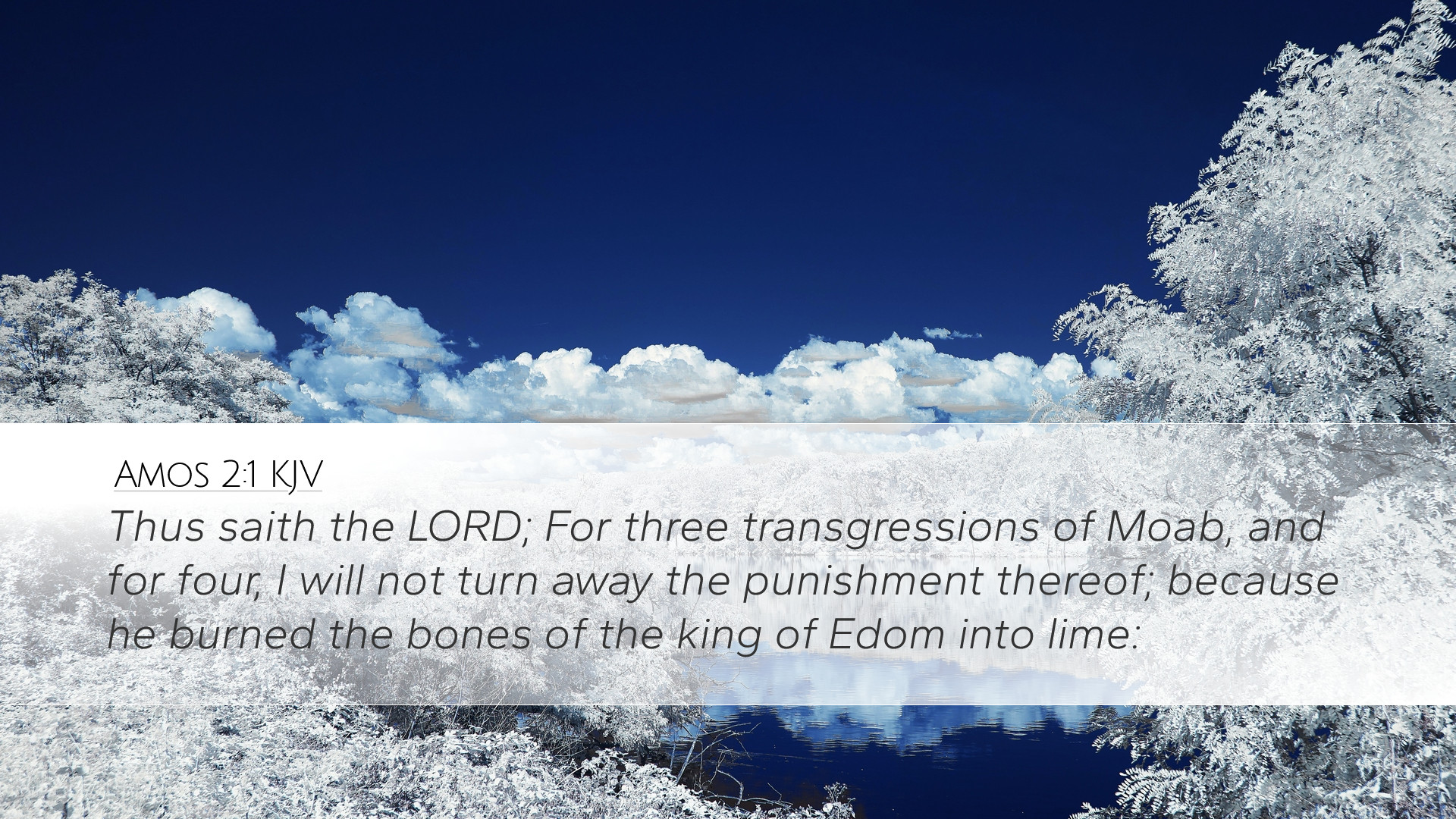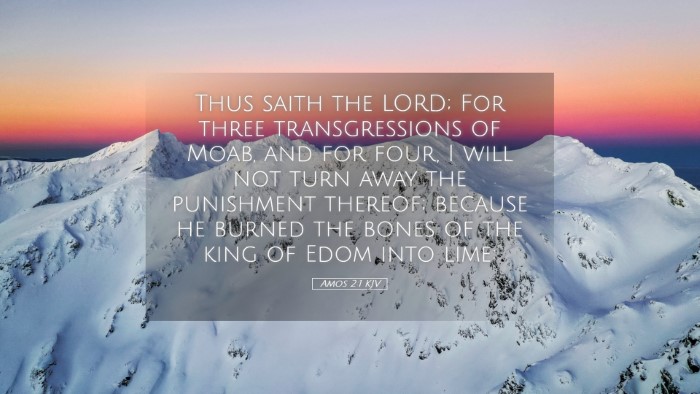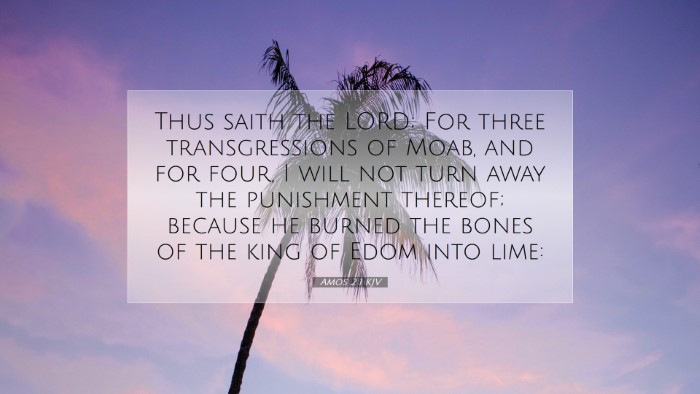Old Testament
Genesis Exodus Leviticus Numbers Deuteronomy Joshua Judges Ruth 1 Samuel 2 Samuel 1 Kings 2 Kings 1 Chronicles 2 Chronicles Ezra Nehemiah Esther Job Psalms Proverbs Ecclesiastes Song of Solomon Isaiah Jeremiah Lamentations Ezekiel Daniel Hosea Joel Amos Obadiah Jonah Micah Nahum Habakkuk Zephaniah Haggai Zechariah MalachiAmos 2:1
Amos 2:1 KJV
Thus saith the LORD; For three transgressions of Moab, and for four, I will not turn away the punishment thereof; because he burned the bones of the king of Edom into lime:
Amos 2:1 Bible Commentary
Commentary on Amos 2:1
Verse: "Thus saith the Lord; For three transgressions of Moab, and for four, I will not turn away the punishment thereof; because he burned the bones of the king of Edom into lime."
Introduction
Amos 2:1 stands as a potent declaration of divine judgment against Moab. This verse reflects God’s justice, showcasing His precise accountability of nations and their transgressions. As we delve into this commentary, we draw insights from Matthew Henry, Albert Barnes, and Adam Clarke, aligning them with a comprehensive understanding suited for pastors, theologians, and students of the scripture.
Contextual Background
Amos, a shepherd and prophet of the 8th century BC, proclaims a message primarily directed toward Israel but also addresses surrounding nations, laying bare the moral failings of Israel's neighbors. The mention of Moab here serves as a poignant reminder of God's sovereignty over all nations.
Analysis of the Verse
Divine Judgment
Amos begins with a strong assertion: “Thus saith the Lord,” indicating the weight of the message that follows. The phrase signifies divine authority and is a common formula in prophetic literature. Henry remarks that this declaration underscores the certainty of God’s judgments against sin.
Enumerating Transgressions
God specifies that He will not turn away His punishment for “three transgressions” and “for four”. This rhetorical structure is noteworthy. Barnes elucidates that the phrases depict a complete and excessive wickedness. The numbers are not literal but symbolize an overflowing cup of iniquity - one that has reached its limit. It reflects the ancient Near Eastern literary style that emphasizes the accumulation of sin.
The Sin of Moab
Moab's specific transgression, mentioned here, involves the desecration of the dead. The act of burning the bones of the king of Edom into lime was both a heinous affront to the dignity due to the deceased and a serious breach of ethical conduct. Clarke notes that this act was seen as an insult and a sign of deep animosity, demonstrating Moab's overt contempt for Edom and reflects broader themes of hatred and violence common in the context of ancient warfare.
Historical Context
The historical tension between Moab and Edom goes back centuries, characterized by frequent conflict. The action described in this verse likely alludes to an event that was both politically motivated and driven by deep-seated animosity. Such behavior is not merely a cultural faux pas but represents a profound moral failure. According to Henry, God’s distaste for such actions is foundational to understanding holiness within His creation.
Theological Implications
God's Sovereignty
This verse illustrates the theological principle of God’s sovereignty over nations. His judgment is not confined to Israel alone but extends to all nations, including those outside of His covenant people. This serves as a reminder to modern believers of God’s universal authority. Barnes articulates that every nation is accountable to God, emphasizing that divine justice is impartial.
The Nature of Sin
Amos 2:1 invites readers to reflect on the nature of sin. The passage teaches that heinous acts, especially those against God’s creation, do not go unnoticed. Clarke indicates that the burning of bones is emblematic of extreme disdain and reflects a natural outgrowth of idolatry and barbarism within Moab's culture. The transgression serves as a metaphor for human depravity and the inhumane treatment of others.
Repentance and Redemption
Although this verse conveys God’s impending judgment, it also highlights the possibility of repentance for nations. While the focus here is on Moab’s sins, the broader narrative of scripture throughout history encourages nations to turn towards God. The prophets often called out nations to repentance in hopes that they might turn and seek reconciliation with God.
Practical Applications
- Awareness of Accountability: As pastors and leaders, it’s crucial to remind congregations that God's justice extends to all aspects of life, including national actions. Nations, like individuals, are held accountable for their actions.
- Encouragement to Examine Behavior: The Church should reflect on its own treatments of others, fostering a culture that abhors injustice, dishonor, and hatred, reflecting Christ's love.
- Call for Intercession: We are called to intercede not merely for our nations but also for others that may be caught in cycles of violence and animosity, seeking restoration.
Conclusion
Amos 2:1 stands as a sobering reminder of God’s stance against sin and transgression. Both individual behaviors and national ethics are within the scope of divine scrutiny. This verse not only confronts the ancient Moab but beckons modern readers to introspection regarding justice and morality. Through the eyes of Henry, Barnes, and Clarke, we glean that God's justice is indeed impartial but also calls us to repentance and action, urging us to strive for righteousness in our own lives and communities.


